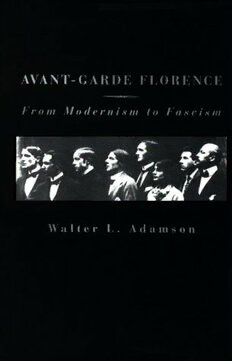
Avant-Garde Florence: From Modernism to Fascism PDF
350 Pages·1993·7.418 MB·English
Most books are stored in the elastic cloud where traffic is expensive. For this reason, we have a limit on daily download.
Preview Avant-Garde Florence: From Modernism to Fascism
Description:
They envisioned a brave new world, and what they got was fascism. As vibrant as its counterparts in Paris, Munich, and Milan, the avant-garde of Florence rose on a wave of artistic, political, and social idealism that swept the world with the arrival of the twentieth century. How the movement flourished in its first heady years, only to flounder in the bloody wake of World War I, is a fascinating story, told here for the first time. It is the history of a whole generation's extraordinary promise--and equally extraordinary failure. The "decadentism" of D'Annunzio, the philosophical ideals of Croce and Gentile, the politics of Italian socialism: all these strains flowed together to buoy the emerging avant-garde in Florence. Walter Adamson shows us the young artists and writers caught up in the intellectual ferment of their time, among them the poet Giovanni Papini, the painter Ardengo Soffici, and the cultural critic Giuseppe Prezzolini. He depicts a generation rejecting provincialism, seeking spiritual freedom in Paris, and ultimately blending the modernist style found there with their own sense of toscanit? or "being Tuscan." In their journals--Leonardo, La Voce, Lacerba, and l'Italia futurista--and in their cafe life at the Giubbe Rosse, we see the avant-garde of Florence as citizens of an intellectual world peopled by the likes of Picasso, Bergson, Sorel, Unamuno, Pareto, Weininger, and William James. We witness their mounting commitment to the ideals of regenerative violence and watch their existence become increasingly frenzied as war approaches. Finally, Adamson shows us the ultimate betrayal of the movement's aspirations as its cultural politics help catapult Italy into war and prepare the way for Mussolini's rise to power.
See more
The list of books you might like
Most books are stored in the elastic cloud where traffic is expensive. For this reason, we have a limit on daily download.
